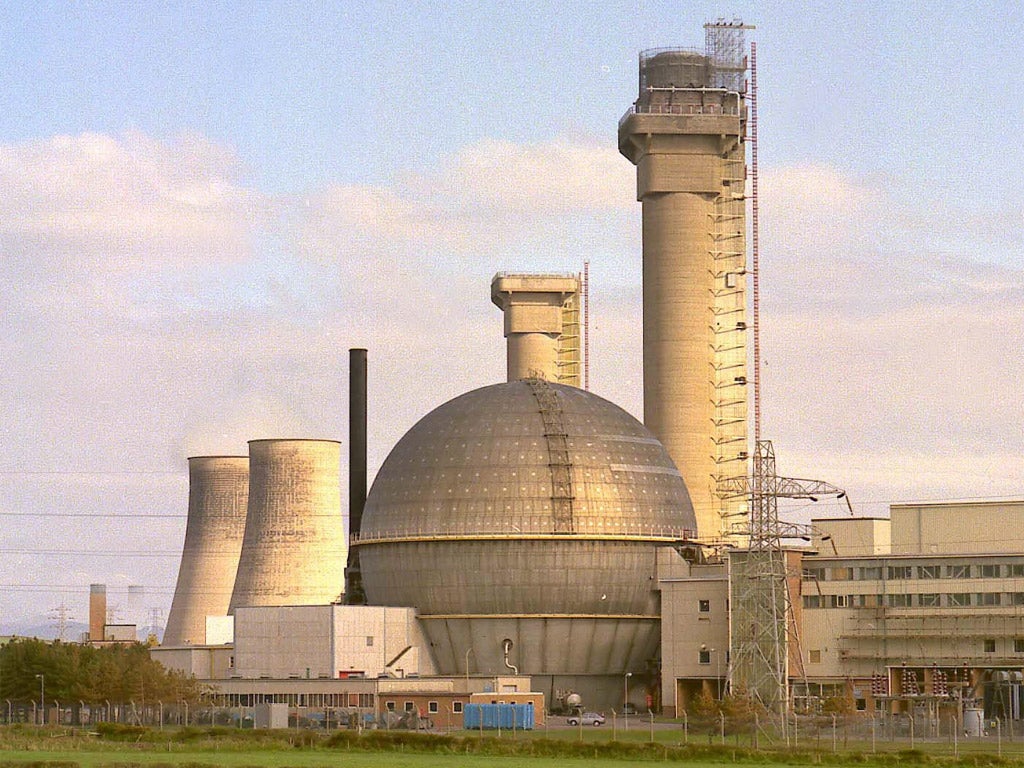Nuclear storage clean-up bill could cost £70bn

Your support helps us to tell the story
From reproductive rights to climate change to Big Tech, The Independent is on the ground when the story is developing. Whether it's investigating the financials of Elon Musk's pro-Trump PAC or producing our latest documentary, 'The A Word', which shines a light on the American women fighting for reproductive rights, we know how important it is to parse out the facts from the messaging.
At such a critical moment in US history, we need reporters on the ground. Your donation allows us to keep sending journalists to speak to both sides of the story.
The Independent is trusted by Americans across the entire political spectrum. And unlike many other quality news outlets, we choose not to lock Americans out of our reporting and analysis with paywalls. We believe quality journalism should be available to everyone, paid for by those who can afford it.
Your support makes all the difference.Britain is storing an "extraordinary accumulation of hazardous nuclear waste" in "outdated facilities" which will cost nearly £70bn to clean up, MPs have warned the Government.
Almost all of the major nuclear-decommissioning projects at the Sellafield complex in Cumbria are behind schedule and many of them are over-budget according to a Parliamentary inquiry into Britain’s “failing” nuclear-reprocessing industry.
The findings will reinforce concerns that the Government’s strategy for dealing with nuclear waste is unravelling following the refusal last week of Cumbria County Council to allow the drilling of a deep underground repository for high-level waste in the Lake District.
In a highly critical report the influential Public Accounts Committee said that of the 14 major projects at Sellafield, 12 are behind schedule and five of them are costing more than anticipated, yet the private companies running the plant are being paid handsomely without taking on any risk.
One project in particular, the plan to build a giant construction called Evaporator D to deal with liquid radioactive waste, has not been good enough and is 18 months behind schedule and almost £250m over-budget since 2009, it says.
At the same time, nuclear executives seconded from private companies are being paid “huge salaries”, averaging £690,000, by the taxpayer without any pay caps. One director was paid just over £1.2m, the report says.
The excessive payments and the way in which they are made could be seen as a “reward for failure”, the committee said.
Yet it is the taxpayer rather than the private consortium running Sellafield that has taken on the risk of delays and cost increases connected with the plant.
Sellafield is under the control of the Nuclear Decommissioning Authority, set up in 2005 by the Government to oversee the enormous legacy of Britain’s nuclear waste.
The site is managed by Sellafield Limited in conjunction with an international private consortium, called Nuclear Management Partners Limited.
The Government is currently about £1.5bn a year on Sellafield and the estimated lifetime cost of decommissioning the site has now reached £67.5bn.
Margaret Hodge, chair of the public accounts committee, said it was far from clear that this money was being spent wisely.
“An enormous legacy of nuclear waste has been allowed to build up and over decades, successive governments have failed to get to grips with this critical problem,” she said.
“The Nuclear Decommissioning Authority believes that its decommissioning plan is credible but it has not been sufficiently tested and uncertainties remain – not least around what precisely is in the waste that lies in the legacy ponds and silos.
“It is unclear how long it will take to deal with hazardous radioactive waste at Sellafield or how much it will cost the taxpayer. Furthermore, now that Cumbria County Council has ruled out West Cumbria as the site of the proposed geological disposal facility, a solution to the problem of long-term storage of the waste is as far away as ever.
“Taxpayers will have to foot the bill. Private contractors who gain contracts take no risk because of the uncertainties that persist. Taxpayers are not getting a good deal.”
The committee called on the Major Projects Authority to review the most critical and largest projects, and should report publicly on the progress of key risk reduction programmes against plans and budgets.
It said the authority should ensure all payments to private companies were linked to the value delivered and that payments are not made where companies had failed to deliver.
“All payments to Nuclear Management Partners, and to its constituent companies, need to be strictly controlled and determined by the value gained, so that payments are not made where companies have not delivered,” Ms Hodge added.
Join our commenting forum
Join thought-provoking conversations, follow other Independent readers and see their replies
Comments